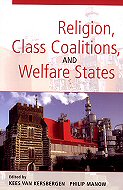|
Religion, Class coalitions and Welfare States
|
|
Edited by Kees Van Kersbergen, Philip Manow
|

|

This book radically revises established knowledge in comparative welfare state studies and introduces a new perspective on how religion shaped modern social protection systems. The interplay of societal cleavage structures and electoral rules produced the different political class coalitions sustaining the three welfare regimes of the Western world. In countries with proportional electoral systems the absence or presence of state–church conflicts decided whether class remained the dominant source of coalition building or whether a political logic not exclusively based on socio-economic interests (e.g. religion) was introduced into politics, particularly social policy. The political class-coalitions in countries with majoritarian systems, in contrast, allowed for the residual-liberal welfare state to emerge, as in the US or the UK. This book also reconsiders the role of Protestantism. Reformed Protestantism substantially delayed and restricted modern social policy. The Lutheran state churches positively contributed to the introduction of social protection programs.
Keen van Kersbergen is a professor of political science at VU University Amsterdam. […] He is the author of Social Capitalism (1995) […] He has published widely in major journals and books, including The European Journal of Political Research, the Journal of Common Market Studies, the Journal of Theoretical Politics, The Politics of Post-Industrial Welfare State (2006) and Culture and the Welfare State (2008)
Philip Manow is a professor of political science at the University of Konstanz. […] His works has been published in numerous journals and collections, including European Journal of Political Research, West European PoliticsComparative Political Studies, The New Politics of the Welfare State (2001), and Federalism and the Welfare State (2008)
|
|
